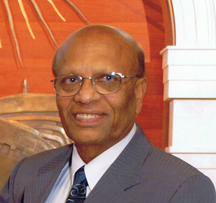Jainism has the right message for the present time. Prof. John Koller of Rensselaer Polytechnic Institute states, “Perhaps the greatest contributions to Indian life were made by Jain exemplars of moral virtue and careful reasoning. Their migration from the Ganges Valley to the southern tip and over the western borders of the subcontinent allowed them to spread the best of Indian culture to these parts of India through their exemplary lives. Jain adherents to the rule of non-injuring has been a major factor in the importance that this moral principle has assumed in Buddhist and Hindu life over the centuries. Mahatma Gandhi, the Hindu saint whose adherence to non-injuring in his successful efforts to throw off the yokes of British colonial rule, bringing the principle of nonviolence to the admiring attention of the whole world, gratefully acknowledged the great impression made on him by the virtuous Jains he knew as a youth.”
On May 7, 2014, Professor Philip Clayton (former Dean and Provost at Claremont School of Theology and Claremont Lincoln University in Claremont California wrote;
“Dear Friends, In a few minutes I will be teaching this beautiful article on Jainism and Ecology, “views of nature, nonviolence, and vegetarianism,” by Michael Tobias, first published in Mary Evelyn Tucker and John Grim, eds., Worldviews and Ecology. I have attached the article here, although you probably already know it.
I write to you in part because I am moved by its description of the power of the Jain way of life and by the importance of this message in a world facing ecological catastrophe.I write to you even more because I am struck by how essential it is that this message of Applied Jainism be made available in American higher education. Future leaders do not need a “secular,” post- religious worldview that tells everyone to “just get along.” In the world’s oldest religion, Jainism, there is such a depth of wisdom that we can never re-create it simply by inventing a new worldview or ethical code. And of course Jainism is not the only religion of depth; the messages of the other ancient wisdom traditions are also important.
I am moved to write you to encourage you not to give up the quest that first brought the four of us together. Our dream was right; our goals were noble; and what we sought to establish is just as needful today as before. I am convinced in the depth of my being that it is crucial that graduate students, the future leaders of America, are exposed to these teachings. They will express them in different ways, no doubt. But without this guidance they will not have the wisdom to address the profound challenges that await their generation.
In friendship, Philip”.
If we don’t start acting quickly and in unison, our fate will be what Mahavir Sanglikar-bhai, mentioned in his satirical way in describing Butcher Land. Soon there will be many Jain butcher lands all around and within us. The day is not far off when a new definition of ahimsa will emerge which will condone every kind of himsa by Jains with the only possible exception being in the Thali. Even that is becoming a distinct possibility. In a world of rapid change you either move forward or you move backward. I am afraid that as things are moving in real life (I see it happening daily) when meeting a fellow Jain, one will be asking if he is a vegetarian or a non- vegetarian Jain.
Dr. Brianne Donaldson, noted Jain scholar, wrote the following call for action: “I want to hear everyone talking about Jainism. I want religion and philosophy departments teaching it. I want ecologists and agricultural technicians exploring its sustainability models. I want animal ethicists investigating it. I want metaphysicians engaging its textual and cosmological claims. I want economics departments examining its charitable giving and solvency. I want diplomats, nonviolent practitioners and just war theorists scrutinizing it as a viable political way of life. In short, I want it on the lips of every discipline, colliding with existing wisdom, challenging epistemological strongholds, and generally throwing a wrench into any sentiment that would dismiss as impractical the possibilities of humans living in a fundamentally different manner in our current and future worlds.”
I hope and pray that we are listening to her.
I want to close this chapter with a clarion reminder from an American musician John Denver, who wrote,
“Yes there still is time to turn around
And make all hatred cease
Let’s give another name to living
And we can call it peace.”
 Dr. Sulekh Chand Jain
Dr. Sulekh Chand Jain
